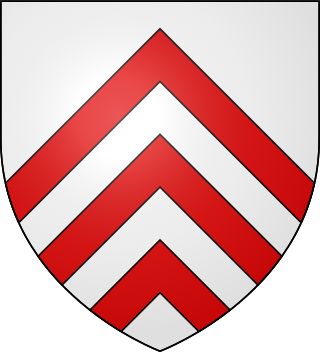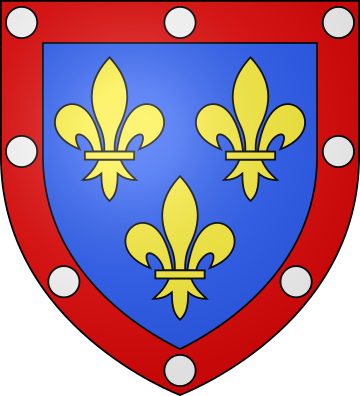Peter II of Alençon, called The Noble (1340 – 20 September 1404; French: Pierre II d'Alençon, or Pierre de Valois), was Count of Alençon from 1361 and Count of Perche from 1377. He was the son of Charles II of Alençon and Maria de la Cerda.[1]
Peter II, Count of Alençon | |
|---|---|
 Peter II's coat of arms, per the Armorial of the Capetian dynasty. | |
| Born | 1340 |
| Died | 2 September 1404 (aged 63–64) Argentan, Normandy, France |
| Noble family | Valois-Alençon |
| Spouse(s) | Marie Chamaillard, Viscountess of Beaumont-au-Maine |
| Father | Charles II of Alençon |
| Mother | Maria de la Cerda |

Biography
Peter II of Alençon (French: Pierre d'Alençon) was born in 1340 to Charles II, Count of Alençon and Perche and his wife, Maria de la Cerda, Countess of Alençon. Upon his father's death in 1346, Peter's elder brother, Charles, inherited the title of "Count of Alençon".
Knighted in 1350, Peter was one of the hostages exchanged for King John after the Battle of Poitiers, and did not return to France until 1370.[2] He and his younger brother, Robert of Alençon, Count of Perche, campaigned against the English in Aquitaine. In 1371, the French took Limoges, but failed to capture Usson.[citation needed]
In 1361, Peter's elder brother, Charles III, Count of Alençon, renounced his counties[3] and became a Dominican friar, choosing Couvent des Jacobins de la rue Saint-Jacques in Paris.[4][Note 1] Philip, the eldest of Charles's younger brothers, had become bishop of Beauvais in 1356,[3] and so their mother obtained permission from King John II of France to divide the counties between the remaining brothers, Peter and Robert. Peter received Alençon, and became Count of Alençon, while Perche was assigned to Robert, who became Count of Perche.[5]
In 1372, Peter bought the town, château, and surrounding lands of Argentan, one of the most important towns in Normandy, for 6,000 livres in gold. Peter later moved his court to Argentan, as it was a fortified hilltop town about 15 miles (24 km) north of Alençon.[6][7]
Upon the death of his younger brother, Robert of Alençon, Count of Perche in 1377, Peter also inherited his title of Count of Perche, including the lands of Perche and fortresses at Bellême and Exmes, as Robert had no surviving issue. The inheritance was approved by King Charles V of France.[6]
Peter subsequently fought under Bertrand du Guesclin in Brittany; was wounded before Hennebont; and took part in an expedition against William I of Guelders in 1388.[citation needed]
Marriage and issue
On 10 October 1371, at the age of 31, Peter married Marie Chamaillard, Viscountess of Beaumont-au-Maine (c. 1350–18 November 1425), the daughter of William (Guillaume) II Chamaillard, seigneur (viscount) d'Anthenaise (c. 1320–1391) and Lady Marie de Beaumont-Brienne. The Chamaillard family was a powerful noble family, originally from Anjou. Marie Chamaillard was heiress to the seigneury of Pouancé, including Pouancé Castle, and four other fiefs, adding them to the fiefs already owned by her husband.[6]
The couple had eight children, though their birth order is disputed:[Note 2]
- Marie of Alençon (29 March 1373 or 21 Mar 1374–1417 or 1418), born at the Château d'Essay in Essay, Orne. She married John VII of Harcourt, Count of Harcourt and Aumale, son of John (Jean) VI, Count of Harcourt and Aumale, and his wife, Catherine de Bourbon, the sister of Joanna of Bourbon, Queen of France, on 17 March 1389 or 1390.[8] Marie died before 1417 or 1418 at the Cordeliers Convent. Had issue.
- Peter (Pierre) (1374–1375), born at the Château d'Argentan in Argentan. Per Cagny's Chronique d'Alençon, the infant Pierre "was poorly governed by the women who looked after him and by his nurse", and died as a result. He was buried at Perseigne Abbey.
- John I (Jean I) (1375–1376), born at the Château d'Argentan in Argentan. He was buried at Perseigne Abbey.
- Marie d'Alençon (1376–1377), buried at Perseigne Abbey.
- Jeanne of Alençon (c. 1372 or 1377–6 August 1403), born at the Château d'Essay in Essay, Orne, and died at the Château d'Argentan in Argentan.[9] No issue.
- Catherine of Alençon (1380–22 or 25 June 1462, Hôtel d'Auxerre, Paris), born at the Château d'Verneuil in Verneuil-sur-Avre, Eure. She firstly married in April 1411 to Peter d'Évreux, Infante of Navarre and Count of Mortain (1366–1412), at the Château d'Alençon in Alençon; and married secondly to Louis VII, Duke of Bavaria-Ingolstadt (1365–1447) on 1 October 1413 in Paris. On 29 August 1404, per the last will and testament of her father, Catherine became the heiress to the Château d'Exmes in Exmes; the viscounty of Saint-Sylvain and Thuit; as well as the two seigneuries of Saint-Loyer-des-Champs and Aunou-le-Faucon.[Note 3] No surviving issue.
- Marguerite of Alençon (1383 – aft. 4 Sep 1404), born at the Château d'Argentan in Argentan. She became a nun at Argentan Abbey. No issue.
- John I of Alençon (Jean I) (9 May 1385–1415),[1] born at the Château d'Essay in Essay, Orne. In 1396, he married Marie of Brittany (1391–1446), daughter of John IV, Duke of Brittany and Joan of Navarre. In 1404, upon his father's death, he succeeded him as Count of Alençon and Perche. He was made Duke of Alençon in 1414. Had issue.
He also had one illegitimate son with Jeanne de Maugastel, Dame de Blandé, the wife of Pierre Cointerel, Count of Aunou-le-Faucon and Viscount of Perche under Peter:[10]
- Peter, "Bastard of Alençon" (French: Le Bâtard d'Alençon) (c. 1375–d. aft. January 1422), Lord of Aunou-le-Faucon[6][Note 3]
In popular culture
In the 2021 film The Last Duel directed by Ridley Scott, he is portrayed by actor Ben Affleck.[11]
References
Notes
Sources
Wikiwand in your browser!
Seamless Wikipedia browsing. On steroids.
Every time you click a link to Wikipedia, Wiktionary or Wikiquote in your browser's search results, it will show the modern Wikiwand interface.
Wikiwand extension is a five stars, simple, with minimum permission required to keep your browsing private, safe and transparent.
